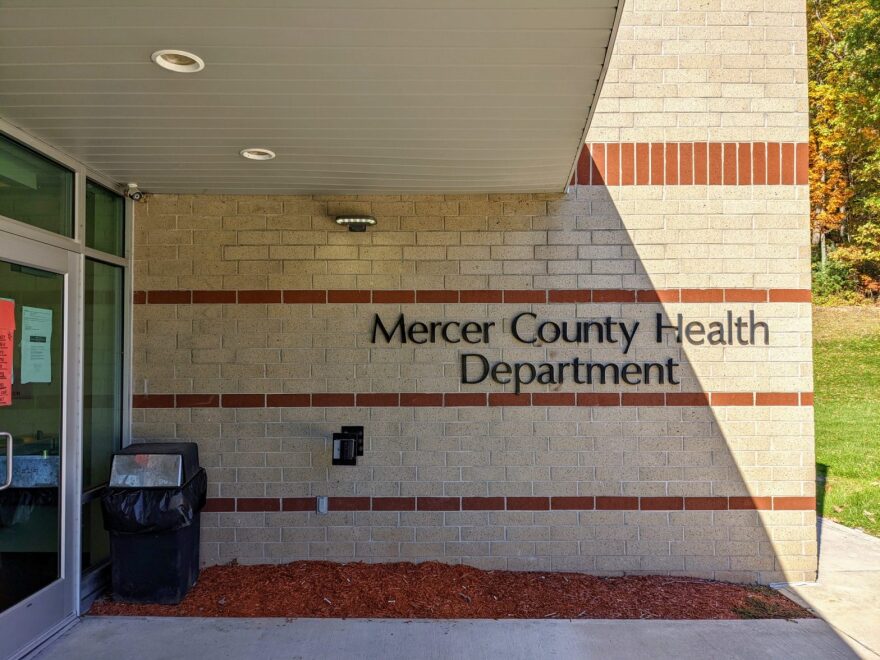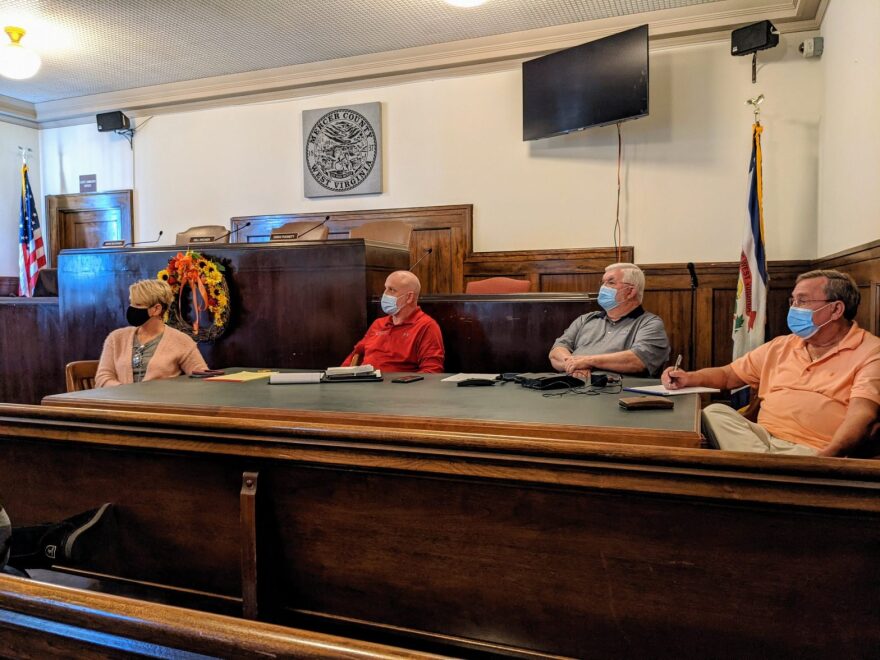
This story was originally published by Mountain State Spotlight. Get stories like this delivered to your email inbox once a week; sign up for the free newsletter at https://mountainstatespotlight.org/newsletter
Every Thursday afternoon for the past two years, dozens of people made their weekly pilgrimage to a nondescript meeting room at the Mercer County Health Department. There, behind a set of double doors, county health professionals ran the area’s only needle exchange — offering disease testing, counseling and clean needles to stop the spread of infectious diseases among people who use drugs.
And though it hadn’t been around for very long, the program seemed to be working: hepatitis C infection rates were down, as were complaints of needle litter. Substance use disorder professionals said they saw more people enter treatment.
“Things were going well for us, in the very non-complex little system that we had here and that we’ve been doing for about two and a half years with, not, to my knowledge, not a single issue,” said Roger Topping, the head of the health department.
But now, there’s a big issue: a new West Virginia law placing more restrictions on these public health programs. And now, the first thing a person sees when they enter the health department is a sign taped to the meeting room’s door.
“NEEDLE EXCHANGE is no longer available at this facility due to WV Legislature Senate Bill 334 which added requirements that we at the [Mercer County Health Department] cannot meet,” it reads. “Sorry for the inconvenience.”
This terse memorial is all that’s left of the harm reduction program that was created to curb the county’s drug epidemic and communicable disease outbreak.
“Somebody up there in Charleston got heartburn,” Topping said, referring to the lawmakers who supported the bill. “They pushed it really hard and then they got this.”

Quenton King
Proponents of Senate Bill 334, which state lawmakers passed earlier this year, said it would reduce crime, health risks and litter supposedly associated with needle exchanges. But people who worked with the needle exchange in Mercer County say litter and crime weren’t problems, and that the program made the community healthier. Now that Mercer County has ended the needle exchange, citing difficulty complying with the new law, officials fear an outbreak of HIV or hepatitis C may be coming. And they’re unsure how the county will combat it.
They’re not alone. At least twoother counties — Marion and Hampshire — have already closed their exchange programs and there’s been uncertainty about whether the handful of remaining programs around the state will be able to keep their doors open. Among the law’s requirements are that syringe programs only accept West Virginia IDs, uniquely label syringes, require participants to bring back a needle to get a new one and get majority approval from the county and municipality. There’s also the fear of fines for violations, which go up to$10,000.
Public health experts say these requirements will either be cost-prohibitive or will force a program to restrict its services in ways that make them harder to access and end up deterring participants. Topping says that while some larger counties may be in a better position to comply with the rules, smaller and more rural counties are at a disadvantage.
“We’re going to see a lot more HIV in our county, and we’re going to have to try our best to get a handle on that,” Topping said. “And to be quite honest with you, I’m not sure exactly yet, how we’re going to accomplish that. But it’s the next big challenge that we’re going to have.”
‘The first red alert’
For the last few years, Katie Slaughter has worked in addiction and recovery services in Mercer County, including the last year at the needle exchange program. As a peer navigator at Southern Highlands Community Mental Health Center, her job is to build relations with people in active addiction. She knows this process of getting people into treatment doesn’t happen overnight; she’s also in recovery herself.
“Treatment is a big thing for me. I’m a recovering addict. I’ve got almost 10 years clean,” Slaughter said. “So getting people into treatment and showing them that recovery is possible and being able to reach out to these people that are in active addiction at the time and helping them — is a big thing to my heart… harm reduction is like my baby.”

Quenton King
She says besides just distributing sterile needles, Mercer County’s needle exchange connected people who use drugs to other services — whether they wanted to take advantage of them at the moment or not.
Slaughter said every person who came to the exchange had to meet with her and other staff before they left.
“Some of them we even sit there and do peer support with them, kind of talk them through whatever problem they have going on,” Slaughter said. “Or we sit there and do applications with them to get them into a treatment program.”
Relationships were formed, which is a key goal of needle exchange programs because a person is more likely to eventually enter treatment or get screened for diseases.
Another goal of these programs is to slow or stop infectious diseases spread by sharing dirty needles, like hepatitis C and HIV. In Mercer County, rising rates of hepatitis C were one of the factors that initially spurred the county to create the needle exchange.
“In 2013, that was really the first red alert that we saw in Mercer County, and that was when we declared a public health outbreak from our hepatitis C rates,” said County Commissioner Greg Puckett.
Between 2007 and 2015, Mercer County accounted for nearly 24% of all acute hepatitis C infections in West Virginia, according todata from the West Virginia Department of Health and Human Resources. That’s despite Mercer making up just 3% of the population.
And while it wasn’t in operation for very long, there are signs the needle exchange was working. New hepatitis C cases dropped from400 in 2018, the year before the exchange was created, to207 in 2020. Data from 2021 is unavailable.
But now without a needle exchange, county officials fear hepatitis C rates will rise again — and that this time HIV may come with it.
‘Ground zero’
Robin Pollini, an infectious disease specialist and professor at West Virginia University’s School of Medicine, warned that hepatitis C outbreaks could be a “canary in the coal mine” for a future HIV outbreak among people who use drugs.
“Hepatitis C came first in the Scott County outbreak,” she said, referring tothe HIV outbreak in rural Indiana in 2015. “You see hepatitis C first because it’s more highly transmissible. Seeing hepatitis C is an indication that you have equipment-sharing going on.”
West Virginia counties have also grappled with HIV in recent years. Cabell County had an outbreak in 2018 and 2019, and Kanawha is currently facing one as well.Experts believe that the closure of Kanawha County’s needle exchange program in 2018 set the stage for this outbreak, which hasseen 31 new HIV cases among people who use drugs so far this year.
While hepatitis C numbers have been high in Mercer, new HIV infections averaged just two per year between2013 and 2017, and have totaled less than five per year since 2018 (DHHR does not give the actual number of cases if it is less than five). Puckett thinks the low numbers reflect a lack of testing in the county.

Quenton King
Like Topping, Puckett fears that restricting needle exchange and other harm reduction programs will worsen HIV and hepatitis C infections in Mercer County and further stigmatize people who use drugs. And he thinks that the crisis won’t be contained within the county.
Referring to the U.S. Centers for Disease Control’slist of 220 counties most vulnerable to an HIV or hepatitis C outbreak, Puckett said, “if you look at where we are, comprehensively in Appalachia, we are the most potential outbreak, so ground zero is a 50-county radius around us.”
If that happens, Mercer County and those surrounding counties would be at a different risk compared to West Virginia’s more urban counties such as Cabell and Kanawha, according to Pollini.
“[It] is going to be very difficult if HIV spreads into the more rural areas of West Virginia to find it… Mercer County is a perfect example, Wyoming County is a perfect example,” Pollini said. “It’s going to take a while before we detect it, and that means people who are HIV-positive are sharing equipment. I would venture to guess there’s probably HIV in some of the rural areas already, we just haven’t picked it up yet.”
‘I just want them to bring it back’
Last month, a small group gathered at the Mercer County courthouse. The health board was holding a hearing for the public to give input on the decision to end the needle exchange program. The hearing was a formality: The board felt forced to shutter the program, but they couldn’t make the decision without a public comment and final approval by the county commission, thanks toanother state law passed earlier this year.
Despite the foregone conclusion, Slaughter was there to voice support for reviving the needle exchange.
“What a lot of people don’t realize when they see this program… they see it as just a needle exchange program,” she told the board. “But…we give them information on treatment, we talk with them, we call them weekly. We had a big success rate on just getting [people] into treatment from the program. It’s not just a needle exchange.”.
The three other speakers echoed Slaughter’s support.

Quenton King
Topping said he agreed with speakers’ concerns. But he told the attendees that the board had decided to end the program because “there’s no way in the world we could actively put the program in and follow every one of these directives” in SB 334.
But he still wants to find a way to keep some sort of program that helps the population that had been coming to the needle exchange program and others who needed it.
“I don’t know if we can do it. But I’d like to work toward that,” Topping said.
Slaughter knows the challenges that lie ahead for her and Mercer County. “I just want them to bring it back,” she said, referring to the needle exchange program.
A DHHR spokeswoman says the agency will help any program that keeps operating under the new law. But confronting drug use in Mercer County, including reducing disease spread among users and getting people into treatment, will be difficult without a needle exchange and its capabilities for forming bonds with participants and getting them screened, using clean syringes, and into treatment when they’re ready.
“I’ve never seen an outbreak brought under control without expanding syringe access,” Pollini cautioned. Meanwhile, the new state law that is expected to do the opposite will fully go into effect on Jan. 1.
Reach reporter Quenton King at quentonking@mountainstatespotlight.org
"exchange" - Google News
November 02, 2021 at 10:43PM
https://ift.tt/3nQNbJd
New W.Va. Law Forces Another Needle Exchange Closure - West Virginia Public Broadcasting
"exchange" - Google News
https://ift.tt/3c55nbe
https://ift.tt/3b2gZKy
Exchange
Bagikan Berita Ini














0 Response to "New W.Va. Law Forces Another Needle Exchange Closure - West Virginia Public Broadcasting"
Post a Comment